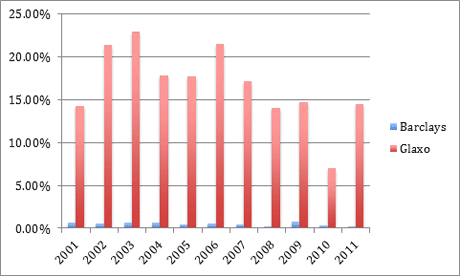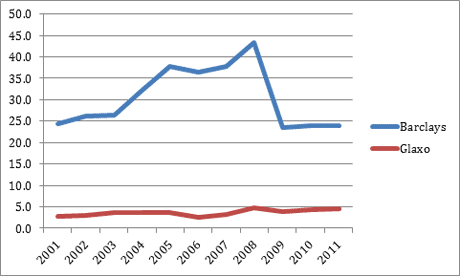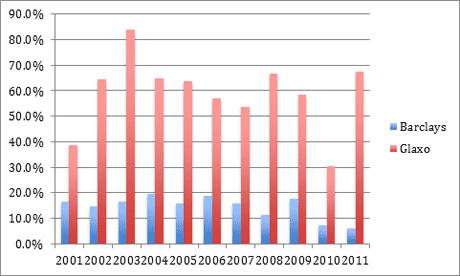Bankers don’t have talent – just lots of borrowed money
The claim that banks need to offer astronomical salaries and bonuses to attract the best talent is a myth, says Phil Oakley. Here's the proof.
Get the latest financial news, insights and expert analysis from our award-winning MoneyWeek team, to help you understand what really matters when it comes to your finances.
You are now subscribed
Your newsletter sign-up was successful
Want to add more newsletters?

Twice daily
MoneyWeek
Get the latest financial news, insights and expert analysis from our award-winning MoneyWeek team, to help you understand what really matters when it comes to your finances.

Four times a week
Look After My Bills
Sign up to our free money-saving newsletter, filled with the latest news and expert advice to help you find the best tips and deals for managing your bills. Start saving today!
Bankers receive far greater financial rewards than the majority of the population. We're not talking about people who work in the high street branches here - the average cost per employee at RBS's UK retail banking business is just over £30,000 -we're talking about investment bankers.
Total pay for employees at Barclays' investment bank for example, averaged £200,000 in 2011 (including average bonuses of £65,000). This is despite the fact that the whole UK banking sector benefits from an implicit, taxpayer-backed guarantee.
So why do bankers get paid so much?
MoneyWeek
Subscribe to MoneyWeek today and get your first six magazine issues absolutely FREE

Sign up to Money Morning
Don't miss the latest investment and personal finances news, market analysis, plus money-saving tips with our free twice-daily newsletter
Don't miss the latest investment and personal finances news, market analysis, plus money-saving tips with our free twice-daily newsletter
Listen to the banks themselves, or their shills in the business pages, or lobbyists like the British Bankers Association (BBA) and the justification for high pay usually comes down to one thing: the banks say they need to attract and retain talented' individuals.
But is all the money they're shelling out for this talent' worth it? Based on the returns they deliver to shareholders, the answer is a resounding "no".
Barclays vs Glaxo: where's the real talent?
We don't doubt that banks employ a lot of bright people. But believe it or not, so do lots of other businesses.
Take GlaxoSmithKline for example. This business employs very intelligent scientists from the best universities. Instead of working for an investment bank, these scientists help deliver fantastic returns to Glaxo shareholders. They also get paid less.
Average annual pay at Glaxo in 2010 was £71,000 vs the £200,000 we mentioned above at Barclays' investment bank (although the average pay at Barclays still comes in at £80,000if you include the high street branches).
One way we can demonstrate the superiority of Glaxo over Barclays is to look at their respective returns on equity (ROE). The beauty of this measure is it can be broken down into bits that tell us how a company makes its money.
MoneyWeek videosWhat is return on equity?Tim Bennett explains the controversial ratio that attempts to quantify how much value for money a company can give shareholders.Watch all of Tim's videos here
ROE can be broken down as follows: Profits after tax/Assets x Assets/Equity = Profits after tax/Equity (ROE)
Put in plain English, if you take the return on assets (the money a company is making from the assets it has as its disposal) and multiply it by the leverage ratio (the extent to which the company has borrowed money to juice up its returns), then you get the return on equity (the return shareholders are ultimately getting).
Have a look at the chart below: it shows that Glaxo's return on assets was nearly 15% in 2011. Barclays' was a miniscule 0.25%.
Return on assets

Now look at each company's leverage: Glaxo's assets were 4.7 times its equity. For Barclays, the ratio was 24 times its equity.
Assets/equity (leverage ratio)

Can you imagine how investors would react if Glaxo leveraged itself 24 times? The truth is it wouldn't be allowed to. The risk of bankruptcy would be too great. Yet for banks, this sort of leverage has been quite common.
Let's be clear here. We aren't suggesting that banks could operate with the same balance sheet as Glaxo. But Barclays' leverage needs to come down a lot. For example, you can see from the chart above that Barclays' leverage peaked at over 43 times in 2008.
In fact, because its returns on assets are so low, Barclays has only been able to earn its returns on equity by taking on huge leverage and huge risk on behalf of its shareholders. There is nothing talented about that.
Return on equity

Even with extreme levels of leverage, Barclays' ROE was a paltry 6.1% in 2011. Glaxo's was an impressive 67.2% with a lot less financial risk.
By digging into Barclays' accounts, we can actually look at the performance of Barclays Capital on the same basis. Barcap's 2011 ROE was 10.4%, but its leverage was a staggering 55 times, with return on assets a meagre 0.18%.
Based on this evidence, is it unreasonable to say that Barcap's employees are paid far too much?
How to make banks more profitable slash bankers' pay
If Barclays' investment bankers were paid the same as Glaxo's employees, then Barcap's pre-tax profits would increase by £3.1bn more than double. Barcap's ROE would be a respectable 21%, although the leverage levels would still be scary.
Applying this new pay structure to the whole of Barclays would increase the group's ROE from 6.1% to 9.5%. This still leaves it a long way from its target of 13% but it would be a step in the right direction.
However, with Barclays being the most leveraged of the UK quoted banks and with capital requirements likely to increase, it will be very difficult for it to earn decent returns with acceptable levels of risk. The same can be said for most banks - which is why you shouldn't invest in them.
Get the latest financial news, insights and expert analysis from our award-winning MoneyWeek team, to help you understand what really matters when it comes to your finances.
Phil spent 13 years as an investment analyst for both stockbroking and fund management companies.
-
 Should you buy an active ETF?
Should you buy an active ETF?ETFs are often mischaracterised as passive products, but they can be a convenient way to add active management to your portfolio
-
 Power up your pension before 5 April – easy ways to save before the tax year end
Power up your pension before 5 April – easy ways to save before the tax year endWith the end of the tax year looming, pension savers currently have a window to review and maximise what’s going into their retirement funds – we look at how